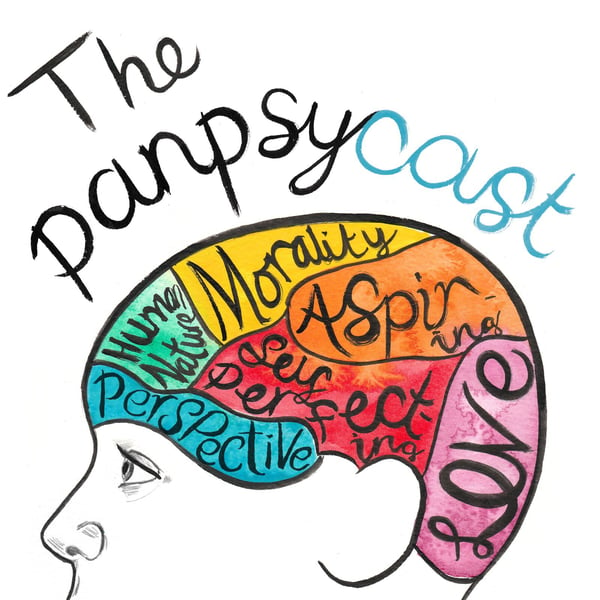Episode 62, Epictetus: A Guide to Stoicism (Part III. Modern Stoicism)
The Panpsycast Philosophy Podcast
Jack Symes | Andrew Horton, Oliver Marley, and Rose de Castellane
4.8 • 604 Ratings
🗓️ 30 June 2019
⏱️ 51 minutes
🧾️ Download transcript
Summary
Imagine you are in an open field which stretches in every direction, further than your eyes can see. Since there is nothing of interest in your immediate surroundings, you set your sights on the horizon. You begin to walk with purpose; long strides eventually break into a run until you are sprinting as fast as you can. After a while, you begin to slow down. Not just because of a lack of breath, but because something doesn’t quite feel right.
Your steps relax to a strolling pace as you turn back to glance at where you started — but it isn’t clear how far you’ve come. You continue walking; at first for hours, then days, and then weeks. Eventually, although the anxiety set in days ago, you come to a stop. No matter how many steps you had taken, the horizon never came any closer. The goal was never realised, regardless of your efforts.
This short passage might tell you something about your own life, or at least a way of thinking which has occupied your mind at one time or another. The horizon in the story is an analogy for instrumental goods. Instrumental goods are those things in life that you want because you believe them to be necessary for your well-being or happiness. A new job or a trip that you’ve always wanted to take, for example.
We think that once we meet these goals, we will somehow achieve happiness as if it was some state which could be reached and maintained forever. But these ideas are sorely misguided. We cannot find and maintain happiness by seeking it in instrumental goods. You see, permanent, unchanging happiness is like the horizon in the story. No matter how hard you work for it, no matter how many promotions you achieve, how many new trips you take, you simply cannot find happiness in this way.
Contents
Part I. The Context and Life of Epictetus.
Part II. The Discourses and The Enchiridion.
Part III. Modern Stoicism.
Part IV. Cognitive Behavioural Therapy.
Part V. Further Analysis and Discussion.
Links
How to Be Free: An Ancient Guide to the Stoic Life, A. A. Long (Amazon).
A Guide to the Good Life: The Ancient Art of Stoic Joy, William Irvine (Amazon).
Discourses and Selected Writings, Epictetus (Amazon).
Psychotherapy: A Very Short Introduction, Tom Burns and Eva Burns-Lundgren (Amazon).
Meditations, Marcus Aurelius (Amazon).
A Handbook for New Stoics: How to Thrive in a World Out of Your Control, Massimo Pigliucci (Amazon).
How To Be A Stoic: Ancient Wisdom for Modern Living, Massimo Pigliucci (Amazon).
The Happiness Hypothesis: Putting Ancient Wisdom to the Test of Modern Science, Jonathan Haidt (Amazon).
Classical Philosophy: A history of philosophy without any gaps, Volume 1, Peter Adamson (Amazon).
The Partially Examine Life, Episode 124: The Stoic Life with Epictetus (Podcast).
Transcript
Click on a timestamp to play from that location
| 0:00.0 | Pan |
| 0:02.0 | Psygast |
| 0:05.0 | P Part 3. Modern Stoicism. |
| 0:21.7 | Knowing me, knowing Andrew, uh-huh, there is nothing he can do, knowing me, knowing Andrew. |
| 0:32.0 | Welcome to Andrew's personality quiz. Andrew, are you ready? |
| 0:35.3 | Taking the stoic approach here, Jack, and ignoring your |
| 0:37.9 | gibes and your mockery. I'm ignoring stoicism. I'm totally invested in this. I didn't prepare |
| 0:44.8 | a quiz. I thought Andrew would just cynically shrug it off. So apologies. I didn't think Andrew would |
| 0:50.0 | bite. So we're going to look at some modern stoicism. We've looked at the ancients. Why is it relevant? |
| 0:55.2 | You know, in 21st century life, we're looking at some different scholars and how they approach |
| 0:59.7 | to us and what they've thrown out and the baby they've saved from the bathwater on the way out |
| 1:05.2 | the window. For this, I've looked at Massimo Puglucci's book, How to Be a Stoic, Ancient Wisdom for Modern Living. |
| 1:14.8 | We've referenced Bill Irvine's A Guide to the Good Life, which is fantastic, that's something as well. |
| 1:19.7 | I've also dipped my toe into the world of psychology. I'll get into that later, but Andrew, |
| 1:24.2 | you've done a lot of psychology for this haven't you why modern stoicism what's |
| 1:28.3 | the framework for you well first of all I'd probably say that if you don't believe that |
| 1:33.5 | Zeus created us and instilled us with a reason then why you're in luck yeah yeah |
| 1:38.8 | clock out now because I'm about to just go on an hour long dedication to Zeus. |
| 1:44.8 | If you don't believe in Zeus, then you'll love this. |
| 1:48.0 | Thor. |
| 1:48.3 | Thor is more my cup of tea, but go on. |
| 1:50.6 | So, yeah, if you weren't thrilled with the reason for why Epicatus would say, like, we should follow our reason. |
... |
Please login to see the full transcript.
Disclaimer: The podcast and artwork embedded on this page are from Jack Symes | Andrew Horton, Oliver Marley, and Rose de Castellane, and are the property of its owner and not affiliated with or endorsed by Tapesearch.
Generated transcripts are the property of Jack Symes | Andrew Horton, Oliver Marley, and Rose de Castellane and are distributed freely under the Fair Use doctrine. Transcripts generated by Tapesearch are not guaranteed to be accurate.
Copyright © Tapesearch 2025.

